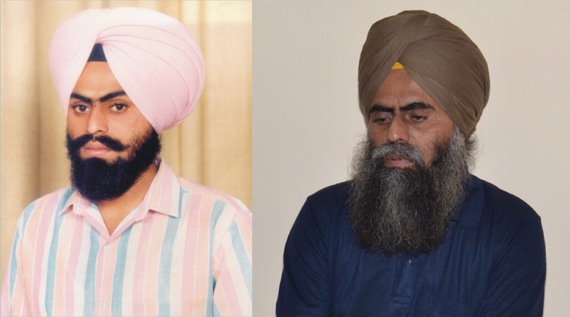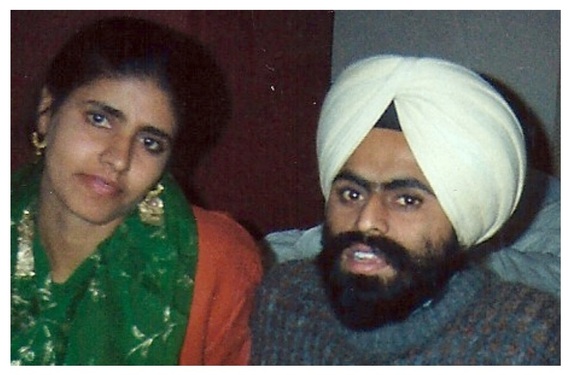In 1995, Sikh political prisoner Professor Devinderpal Singh Bhullar became the first person in Indian history to be sentenced to death in a split Supreme Court decision. Convicted under the now repealed Terrorist and Disruptive Activities (Prevention) Act (TADA), Professor Bhullar's case remains one of the most tragic and prime example of miscarriage of justice.
In 1990, Professor Bhullar was teaching engineering courses at Guru Nanak Polytechnic College in Ludhiana when he was implicated for his alleged role in the bombing of Senior Superintendent of Police (SSP) Sumedh Saini's vehicle. When the police failed to locate Professor Bhullar, they arrested his father and another family member, tortured them, and both died while in custody (Voices for Freedom, 2013).
Three years later, Professor Bhullar was implicated in the car bombing of a government convoy due to its similarity to SSP Saini's bombing. Having already lost two family members through police torture and murder, Professor Bhullar sought political asylum in Germany. He was denied asylum and was extradited back to India (Voices for Freedom, 2013). Upon his return, Professor Bhullar was charged under TADA.
Enacted in 1987, TADA allowed Indian authorities to detain individuals based on vague allegations without a trial. Often these detainments would target minority groups and result in gross human rights violations and torture while in custody (Amnesty International, 1994). It was the collective effort of human rights organizations and political parties that eventually led to its review and repeal in 1995. Despite it being lapsed and deemed unconstitutional, those cases that resulted in convictions while it was enforced, remain valid.
After enduring a six-year trial, Professor Bhullar was sentenced to the death penalty. His conviction was based solely on a confession, which was later recanted due to it being obtained under torture and coercion (Kaur, 2011). There was no other evidence against Professor Bhullar other than the recanted confession.
In 2014, the Indian Supreme Court commuted Professor Bhullar's sentence, citing his declining mental health and delay in the submission of his mercy petition (Amnesty International, 2014). Professor Bhullar has spent more than 20 years in jail and remains imprisoned.
The injustice in Professor Bhullar's case is further exemplified when comparing to the case of Bollywood actor Sanjay Dutt. Dutt was convicted under TADA in 1993 for his involvement and purchasing of weapons from those responsible for the Mumbai serial blasts. After serving 18 months, Dutt was allowed to leave prison, and in November 2006 he was acquitted under TADA and charged with a lesser conviction with the Arms Act. Under the Arms Act, Dutt received a six-year sentence and served approximately three and a half years (Bhatt, 2013). On February 25, 2016, he was granted early release from prison based on good behavior (BBC, 2016).
Professor Bhuller's plight and the unequal treatment of minorities by India's judicial system has been brought to attention by human rights campaigner Bapu Surat Singh Khalsa. Bapu Surat Singh has been on a hunger strike since January 16, 2015, calling for the release of political prisoners. Due to his continued struggle, Professor Bhullar was granted a transfer from Tihar Jail to Amritsar Jail after more than twenty years in June 2015.
The continued unequal treatment and arrest of minorities has also been addressed by the Indian Supreme Court. Specifically referring to the use of TADA, the Supreme Court has warned against police officers abusing their power to target innocent individuals and cause sufferance (BBC, 2012).
As Indian celebrities and police officers continue to receive leniency in their convictions and sentences (which include murder and life imprisonment), Sikh political prisoners such as Professor Bhullar remain in jail with little or no evidence. It is estimated there are more than 100 Sikh political prisoners being kept in jail in India, 70-75 which have served more than their given sentences (The Logical Indian, 2015). Some state governments, such as Gujarat, Uttar Pradesh, and Tamil Nadu, have already taken the initiative to release political prisoners. More states, including Punjab where most of the Sikh political prisoners are being imprisoned, need to do the same and release these prisoners as well.
But what is beyond disturbing and unbearable is the helplessness that Sikhs find themselves in every time India hangs one of ours on the noose to make a statement, or kills one in a fake encounter, or worse - when, on the global stage, the crimes against the innocents are justified as curbing terrorism and the perpetrators of the mass killings and disappearances are venerated as the face of anti-terror.
- Gurmeet Kaur (Sikhchic, 2011)
Amnesty International. (1 November, 1994). India: The Terrorist and Disruptive Activities (Prevention) Act: the lack of "scrupulous care." Retrieved from https://www.amnesty.org/en/documents/ASA20/039/1994/en/
Amnesty International. (31 March, 2014). Commutation of Bhullar's death sentence must spur rethink on death penalty. Retrieved from https://www.amnesty.org.in/show/news/commutation-of-bhullars-death-sentence-must-spur-rethink-on-death-penalty
BBC. (27 September, 2012). India Supreme Court warning over minority arrests. Retrieved from http://www.bbc.com/news/world-asia-india-19739556
BBC. (25 February, 2016). Sanjay Dutt: India Bollywood actor released from jail. Retrieved from http://www.bbc.com/news/world-asia-india-35657086
Bhatt, Miloni. (21 March, 2013). 1993 Bombay blasts: how a gun changed Sanjay Dutt's life. NDTV. Retrieved from http://www.ndtv.com/india-news/1993-bombay-blasts-how-a-gun-changed-sanjay-dutts-life-516852
Kaur, Gurmeet. (8 June, 2011). Judicial Murder: The Case of Devinderpal Singh Bhullar. Sikhchic. Retrieved from http://www.sikhchic.com/columnists/judicial_murder_the_case_of_devinderpal_singh_bhullar
The Logical Indian. (26 September, 2015). A Man Who Is Fasting For 253 Days And Government Doesn't Want You To Know. Retrieved from http://thelogicalindian.com/news/a-man-who-is-fasting-for-253-days-and-government-doesnt-want-you-to-know/
Voices for Freedom. (29 August, 2013). Prof. Davinder Pal Singh Bhullar: A Brief Case Study. Retrieved from http://voicesforfreedom.org/blog/prof-davinder-pal-singh-bhullar-a-brief-case-study/

